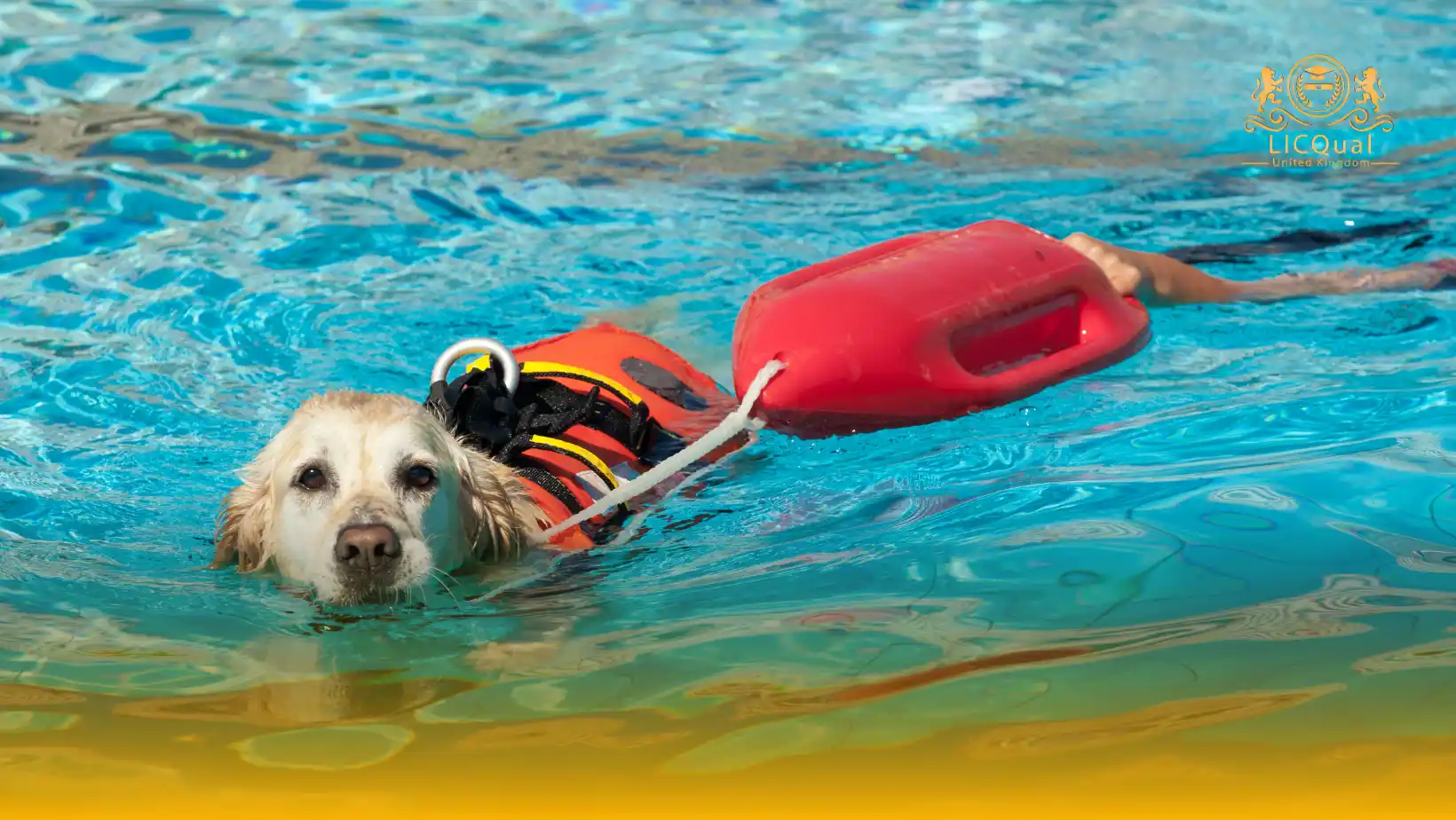The LICQual Level 3 Award in International Lifeguard Qualification is a globally recognised certification designed to equip individuals with the essential skills, knowledge, and confidence to perform professional lifeguarding duties in pools, open water, and coastal environments. This qualification meets international safety standards, ensuring that lifeguards are prepared to prevent accidents, respond to emergencies, and save lives in a variety of aquatic settings. With a strong emphasis on practical training, learners will master lifesaving techniques, rescue operations, first aid, CPR, and effective communication under pressure.
Whether you aim to work at resorts, waterparks, beaches, or leisure centres worldwide, this course provides the credibility and competence employers seek in professional lifeguards. By combining theoretical learning with hands-on training, the qualification develops strong situational awareness, decision-making, and teamwork skills—essential qualities for safeguarding lives in dynamic aquatic environments.
LICQual Level 3 Award in International Lifeguard Qualification qualification covers key lifeguarding principles, water safety management, emergency response protocols, and rescue techniques in compliance with international standards. Participants will also learn how to perform advanced first aid and manage incidents effectively in high-pressure situations. Upon successful completion of LICQual Level 3 Award in International Lifeguard Qualification, graduates will be fully prepared to work as certified lifeguards across the globe, making water environments safer for all.
Course Overview
Qualification Title
LICQual Level 3 Award in International Lifeguard Qualification
Total Units
6
Total Credits
6
GLH
12
Qualification #
LICQ2200596
Qualification Specification
To enroll in the LICQual Level 3 Award in International Lifeguard Qualification applicants must meet the following criteria:
|
Qualification# |
Unit Title |
Credits |
GLH |
|---|---|---|---|
|
LICQ2200596-1 |
Principles of International Lifeguarding |
1 |
6 |
|
LICQ2200596-2 |
Water Safety, Surveillance & Risk Management |
1 |
6 |
|
LICQ2200596-3 |
Rescue Techniques & Equipment Handling |
1 |
6 |
|
LICQ2200596-4 |
First Aid & CPR for Aquatic Emergencies |
1 |
6 |
|
LICQ2200596-5 |
Emergency Response & Incident Coordination |
1 |
6 |
|
LICQ2200596-6 |
Communication, Teamwork & Leadership for Lifeguards |
1 |
6 |
By the end of LICQual Level 3 Award in International Lifeguard Qualification, learners will be able to:
Unit 1: Principles of International Lifeguarding
By the end of this unit, learners will be able to:
- Explain the role, duties, and responsibilities of a professional lifeguard in international contexts.
- Describe the legal, ethical, and safety regulations governing lifeguard operations.
- Demonstrate awareness of cultural and environmental factors affecting lifeguard duties globally.
Unit 2: Water Safety, Surveillance & Risk Management
By the end of this unit, learners will be able to:
- Identify common water-related hazards in pools, beaches, and open-water environments.
- Apply effective surveillance techniques to monitor swimmer safety.
- Implement proactive risk management strategies to prevent aquatic incidents.
Unit 3: Rescue Techniques & Equipment Handling
By the end of this unit, learners will be able to:
- Demonstrate proficiency in water rescue techniques for conscious and unconscious casualties.
- Operate and maintain lifeguard rescue equipment safely and effectively.
- Apply safe casualty recovery methods to reduce further harm.
Unit 4: First Aid & CPR for Aquatic Emergencies
By the end of this unit, learners will be able to:
- Perform CPR on adults, children, and infants in accordance with international guidelines.
- Administer appropriate first aid for common aquatic injuries and medical emergencies.
- Follow infection control and personal safety protocols during first aid delivery.
Unit 5: Emergency Response & Incident Coordination
By the end of this unit, learners will be able to:
- Respond promptly to various aquatic emergencies in line with established procedures.
- Coordinate with emergency services and other lifeguards during incidents.
- Complete incident reports accurately and in compliance with operational requirements.
Unit 6: Communication, Teamwork & Leadership for Lifeguards
By the end of this unit, learners will be able to:
- Communicate effectively with swimmers, colleagues, and emergency responders.
- Work collaboratively within a lifeguard team to ensure public safety.
- Demonstrate leadership skills during rescue operations and routine supervision.
The LICQual Level 3 Award in International Lifeguard Qualification is ideal for anyone passionate about water safety and looking to build a professional lifeguarding career with global recognition. Whether you’re an aspiring lifeguard, an experienced professional seeking international certification, or part of the leisure and tourism industry, LICQual Level 3 Award in International Lifeguard Qualification course equips you with the skills and qualifications to work confidently in pools, beaches, and open water environments worldwide.
1. Aspiring Lifeguards Seeking International Certification
- Perfect for beginners starting a professional lifeguard career
- Provides a globally recognized international lifeguard qualification
- Builds confidence in handling emergencies across diverse environments
- Offers a Level 3 international lifeguard certification trusted by employers
- Opens career opportunities at pools, resorts, and beaches worldwide
2. Experienced Lifeguards Looking to Upgrade Skills
- Ideal for pool or beach lifeguards aiming for international recognition
- Expands expertise with advanced rescue and safety techniques
- Strengthens employability with a LICQual lifeguard certification Level 3
- Prepares candidates for varied aquatic conditions globally
- Enhances skills in casualty management and first aid response
3. Leisure & Tourism Industry Professionals
- Suitable for staff working at resorts, hotels, and leisure centers
- Ensures guest safety through professional lifeguard training
- Adds credibility with an international lifeguard course Level 3
- Helps organizations meet international safety standards
- Provides staff with recognized skills in water safety and rescue
4. Outdoor Activity Leaders & Instructors
- Beneficial for sailing, kayaking, and water sports instructors
- Trains leaders to safeguard participants in open water activities
- Strengthens emergency preparedness and response skills
- Builds trust with clients through professional lifeguard training
- Ensures compliance with global water safety guidelines
5. Students & Job Seekers in Aquatic Careers
- Ideal for individuals pursuing careers in water safety and rescue
- Adds a job-ready international lifeguard qualification to CVs
- Creates opportunities in international leisure and tourism sectors
- Provides transferable skills in risk assessment and teamwork
- Boosts employability in competitive job markets abroad
6. Emergency Response & Rescue Personnel
- Designed for firefighters, coast guards, and rescue teams
- Strengthens ability to handle water-related emergencies
- Provides advanced skills in surveillance, rescue, and casualty care
- Recognized as a professional standard worldwide
- Builds effective teamwork and decision-making under pressure
7. Organizations & Employers in Aquatic Facilities
- Suitable for businesses operating pools, beaches, and resorts
- Ensures staff are trained with an international lifeguard certification
- Reduces liability risks through globally recognized training
- Enhances organizational reputation and safety compliance
- Supports workforce development with certified lifeguards
Assessment and Verification
All units within this qualification are subject to internal assessment by the approved centre and external verification by LICQual. The qualification follows a criterion-referenced assessment approach, ensuring that learners meet all specified learning outcomes.
To achieve a ‘Pass’ in any unit, learners must provide valid, sufficient, and authentic evidence demonstrating their attainment of all learning outcomes and compliance with the prescribed assessment criteria. The Assessor is responsible for evaluating the evidence and determining whether the learner has successfully met the required standards.
Assessors must maintain a clear and comprehensive audit trail, documenting the basis for their assessment decisions to ensure transparency, consistency, and compliance with quality assurance requirements.







